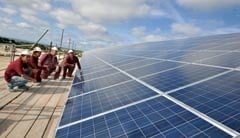Sustainability : FiTs and starts
Following the Government’s defeat in the courts over its proposal to back-date a reduction in feed-in tariffs (FiTs) for solar cell installations to December (before a consultation period had ended) the Department of Energy & Climate Change (DECC) reduced the rates from 3 March and introduced changes to the FiT at the start of this month (April) to try to avoid similar embarrassments in future.
Notably, Fit rates are from now on to be reviewed every six months and an added deployment trigger will enable them to be cut quickly if costs fall suddenly (or, presumably, raise them quickly if costs rise).
The FiT rates at the time solar cells are installed remain guaranteed for a set period (usually 25 years) but the Government aims to set the rate in future to reflect the cost of installations, which it assumes will continue to fall. Suppliers and installers of photovoltaic cells (PVs, otherwise known as solar panels) are concerned that it will be difficult to operate under such a variable scheme.
DECC has also put in place a minimum energy efficiency requirement for anyone wanting to install solar panels on their building and claim the full FiT rate. Properties now have to achieve an Energy Performance Certificate (EPC) rating of ‘D’ or above to qualify. The consultation document had suggested a ‘C’ rating.
It is estimated that around half of all properties are already eligible for a ‘D’ rating. Where properties do not meet the requirement, they will receive 9p/kWh (apart from >250-5MW and stand-alone installations, which receive 8.9p).
A new ‘multi installation’ tariff set at 80% of the standard tariffs was also introduced at the start of this month for solar cell installations where a single or individual organisation is already receiving FITs for 25 or more other solar cell installations. This is designed to reflect the lower costs of these installations through economies of scale. Based on responses received to the consultation, individuals or organisations with 25 or fewer installations will still be eligible for an individual rate.
DECC says these changes build on the best of the system already operational in Germany. It says they will help to keep the long-term costs of supporting PV installations down so the number of people able to benefit from the FiT over time will be as great as possible.
DECC has also announced that it is to review tariffs with a view to reducing the period for which solar PV tariffs should be applied, bringing it down from 25 years to 20.
Energy & Climate Change Minister Greg Barker, who regards these changes as improvements, said: “I am currently looking at how [the FiT] can be further improved to offer certainty for householders, communities and industry and would welcome thoughts on our proposals.”
The new tariff rate of 21p/kWh for domestic size PV installations that the Government wanted to back-date to December came into force on 3 March. Other tariff reductions also apply from that date. You can find them on the DECC website at the address below.

